Data Science careers have already seen unprecedented growth over the last half a decade – unsurprisingly “the sexiest job of the 21st century” according to The Harvard Review attracts on average six figure salaries across most urban cities in the USA. Whilst in the midst of a pandemic their skills are still highly sought after, often relevant in solving these issues and are roles that can also be performed remotely quite well, particularly with the increase in usage of collaborative tools such as Zoom and Quip.
So it’s a very popular career path and no surprise we would all want to know exactly what it costs to jump into the field of Data science. Looking at just the monetary aspects, the cost of learning to become a data scientist would average $10,000. If you wish to be taken seriously, coming from a non-technical/non-computer science background, you’ll more than likely have to invest in programs at that level. It’s not impossible to break into a technology career for next to nothing though, even with a humanities background – check out Bukola from ‘The Come Up’ recently featured on the CNBC Millennial Money series for example (on a whopping $200,000+ salary in NYC for a 20 something year old!), there are definitely options for the determined (LOVE to see women in stem careers!). However, bear in mind, she already had done courses whilst at college as part of her electives. So whilst this unconventional route is possible, it really does depend on which one of the below categories you come from and where you wish to land in the data world.
Not Yet In The Workforce
Generally speaking, if you are still in that high school to undergraduate course of study, you will more likely find it cheaper to make a pivot into a career in data science because the roles you would be offered at your level of work experience would be at the junior end anyway. You can probably start taking on data science projects even whilst at high school by simply offering your data analysis/data munging skills for projects on UpWork for example. Yes, I got my hands dirty automating and scraping data and cleaning it up for consultants/small businesses and nothing demonstrates your value in the data science world faster than portfolio proof of real-world data problems. Once you have chosen the data science path you are more interested in (analyst or engineering – take the quiz here or check out and watch my feature here or read here on differences) then you can utilize free to low cost programs. The main downside with such programs is you have to be really self-motivated and committed to creating structure and accountability for completion. I did like the idea of The ReCurse Centre which Bukola used as it balances the free component with accountability that can help with motivation to complete the course. I would generally favour doing focussed courses on specific areas like SQL, Python for example than a full turnkey “learn everything about data science in one go” as you will simply learn by doing and this is a continuous learning career path. Thats the world of data and coding!
If you are however super determined to land into a more competitive industry though like hedge funds or research geared then I would look to increase my investment and potentially go the route of an advanced degree. The irony is I don’t think it’s absolutely necessary to have one to do the job, apart from competition volume the problem is getting past the gatekeepers a.k.a recruiters that aren’t data scientists and ATS (applicant tracking systems) that track specific keywords for matches and toss the rest into a resume blackhole if they can’t find it. Embarking on an advanced degree does have benefits, gives you more time to hone your skills, network within that community and can give an edge or allow for someone with a non-technical undergraduate program like Jordy who came from performing arts to pivot to Data science via his Columbia program and has now worked as a Machine Learning Engineer at places like PepsiCo and The NBA, check out his interview here. So the cost for a high school or undergraduate to pivot into data science as a career can cost as high as $80,000 for an advanced program, but it’s more likely possible within the region of $0 to $500 + a good dose of grit and hardwork!
In The Workforce
Now if you are already in the workforce, then I’d still ask if you did come from a technical (maths/computer science background) first and if you wanted to pivot to a research/analyst or engineering track.
Technical
If you’re coming from a technical (math/science) background, wanting to move into the research side then a focussed bootcamp can help make the switch and in many cases a reputable quality camp will have some strong industry links to help connect with opportunities more easily. However, as you have a good grasp of technical in your background already, you could very easily DIY and similarly select specific programs to brush up your skills within and then run a few projects you can showcase on your Github portfolio. I’d say you can probably DIY unless you simply need that focussed, structured environment for a short burst of time skilling up as a data scientist or engineer coming from a technical background can cost $0- $10,000 to allow you complete a series of structured courses or full on bootcamp.
Non-Technical
If you are non-technical, you more likely have the most reason to invest a little more to demonstrate you have the know-how if you wish to pivot very quickly. Spend more can either come in the form of an intense quality program in the region of $10,000-20,000 or just over a much longer period of time 18-24 months via a combination of portfolio work you build and a distance online program you develop your skills and experience with. The benefit of the latter being you can do it without having to forgo working income during that period. Going this route can similarly cost from $0- 35,000.
How To Assess The Cost vs Quality of A Data Science Program
I want to be clear, in that most of the time it’s your portfolio and practical experience that counts for most data science opportunities. The degrees, courses and programs don’t really matter until you start to compete in very specific markets or you are looking to pivot in a much faster time frame otherwise with self-motivation and determination you can learn data science for almost no monetary cost but more or less the cost of your time. I honestly see a future where listing data science skills will be a regular on profiles like using Microsoft packages. Everybody uses and interacts with data after-all. That said, here are the things you should look for when evaluating a program of study.
Who is delivering the program of study? The more reputable the company or university/college the more likely it is to “impress” the initial gatekeepers.
Type Is it a certificate, degree or bootcamp? If you are exploring the data analytics tracks then you more than likely do not need more than certificates or short programs to break-in whereas the closer you move to the research and engineering spectrum of data science the more scrutiny your academic background will have in being technically strong enough to be short-listed. Hence the more likely you should be to invest a little more time or money.
Format Post-Corona, I don’t think many people can put a damper on distance learning as much moving forward given the great level of adaptation that occurred during this period. If you are determined and have the capacity to take in the work, distance programs can work well. That said, some people do learn better within group environments and if that’s important to you then consider that. I’d just say be careful you are not over-investing monetarily in a program primarily delivered online, there must be a compelling reason if the cost is high for this either an incredible network to break into, highly reputable institution e.t.c.
Learning Outcome Check out what the specific learning outcomes are and see if they match the descriptions of jobs you are interested in within the world of data. Considering that some roles are not always correctly titled for what the actual descriptions are, focus more on the actual descriptions for the role and not just the title. Even when learning outcomes are listed you should still look in greater detail what precisely is covered.
I have also covered what to consider when making a career pivot or switch to data science and the factors to help you do a good assessment of your skills against here.
Here is a quick summary on how to evaluate at a glance what type of program may be relevant for your background in determining what the cost of learning to become a data scientist should be for you. If you’d like me to evaluate specific courses or boot camps please comment below on which ones and I’ll share my industry insight and how they look to hiring managers.
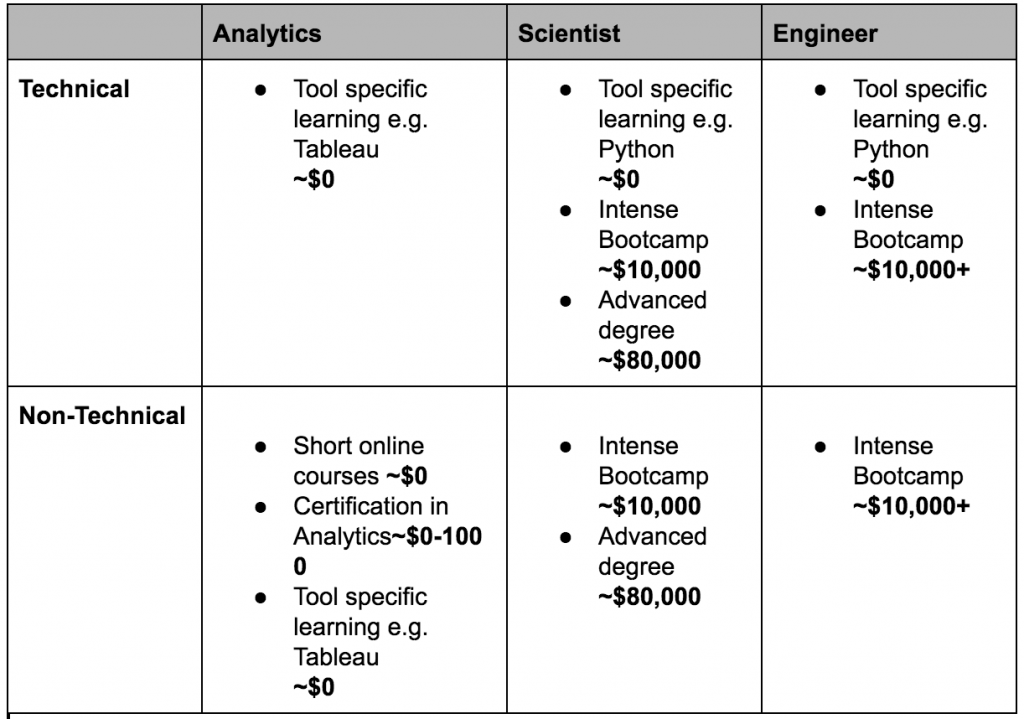

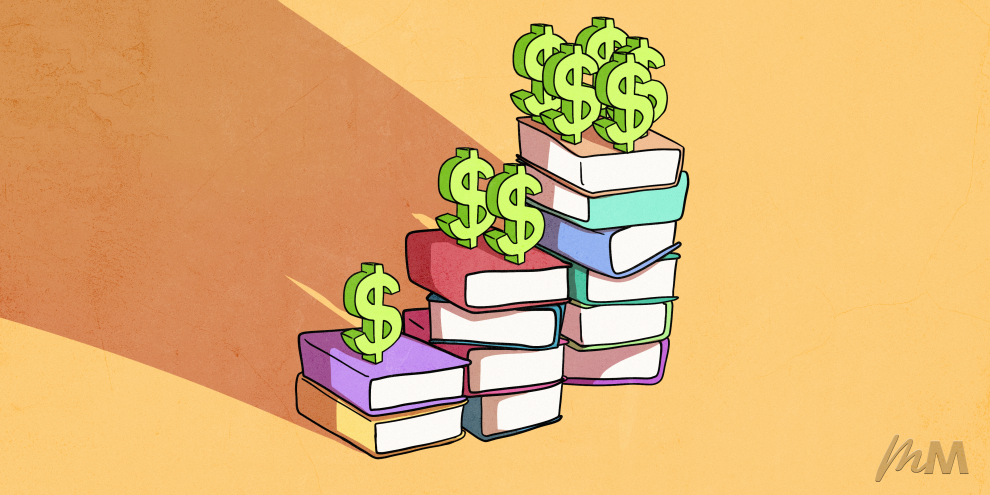

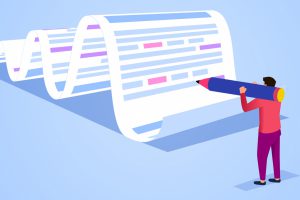





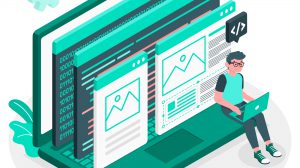
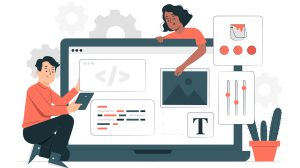
Add Comment